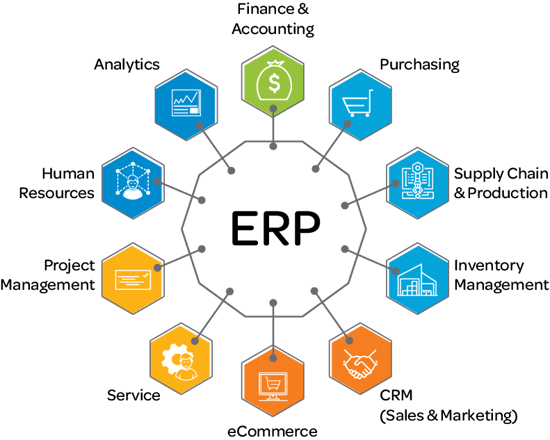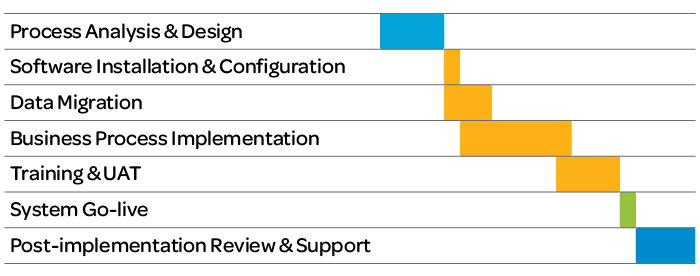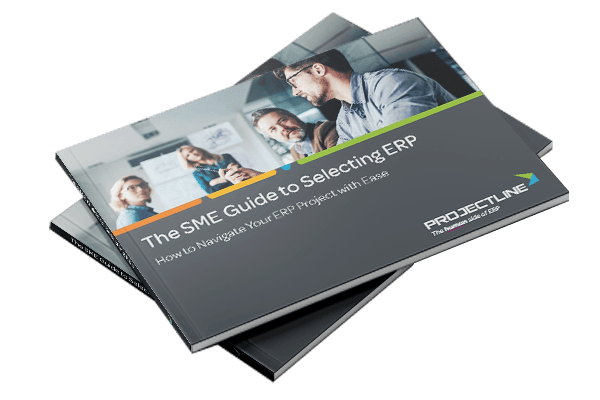The Ultimate Guide to ERP Software
Everything that Growing Small and Mid-size Businesses Need to Know
If you're thinking about new business software, but aren't sure if ERP is right for you – this is the place to start.
We know an ERP search can be daunting. That's why we've created this guide to answer the most common questions about ERP.
What's Inside?
Chapter 1: ERP Basics
- What is ERP?
- What are the benefits of ERP?
- What challenges does ERP solve?
- What modules are included in ERP software?
- How is ERP software deployed?
Chapter 2: Who Uses ERP
- Which industries use ERP software?
- What roles use ERP software?
- Are SMEs big enough to use ERP?
Chapter 3: What to Know About Selecting ERP
- How do we know if we’re ready for ERP?
- What are the top ERP solutions for SMEs?
- How do we select ERP software?
- How much does ERP cost?
- Should we work with an ERP partner?
Chapter 4: ERP Implementation Considerations
- What does an ERP implementation project look like?
- What are the challenges of implementing ERP?
- When should we customize or integrate ERP?
Chapter 1:
ERP Basics
What is ERP?
ERP (Enterprise Resource Planning) is a type of software that manages functions across your business, in one place. Rather than running a separate system for each department (accounting, sales, inventory, purchasing, etc.), ERP software connects all key processes – and the associated data – in a single system.
There are four key attributes that set ERP software apart from other business management software.
- ERP has a shared database that supports multiple business units.
- ERP enables company-wide integration.
- ERP allows you to operate in real-time with process automation.
- ERP provides synchronized reporting without manual effort.
What are the benefits of ERP?
Simply put, ERP software streamlines your business processes, reduces manual effort and makes it easier for your team to do their jobs.
The exact results will vary based on your industry and business structure, but here’s a snapshot of the results companies typically see when they implement ERP.
5–10%
Higher productivity
8%
Higher revenue performance
20–50%
Faster financial close
10–20%
Decrease in days sales outstanding
25–30%
Lower inventory investment
35%
Fewer expedited shipments
LEARN MORE...
6 Ways ERP Improves Financial Management for SMEs
Top 6 Benefits of an ERP Inventory Management System
How ERP Software Will Help You Manage Your Business by the Numbers
6 Ways an ERP System Allows You to Grow Your Business Faster
4 Ways an ERP System Helps You Simplify and Grow Your Small Business
How an ERP System Enables SMEs to Achieve Big Growth
What challenges does ERP solve?
If you’re considering ERP software, it’s for a good reason – your business is successful enough that you’ve outgrown your internal systems and processes.
In our experience, growing companies implement ERP to alleviate pain in one of these four areas. The details may vary from business to business, but the core challenge is consistent.
Challenge 1: Disparate Systems
You’re running QuickBooks or another accounting software, plus one (or more) applications for each area of the business – and let’s not forget the spreadsheets! The challenge is that these applications aren’t connected, so you spend hours each month manually reconciling data. This leads to data errors, delays in decision making and extra manpower that comes with a high cost.
Challenge 2: Inefficient Processes
All that manual effort has a direct impact on the efficiency – and satisfaction – of your team. Not only does it take more time to do simple, everyday tasks, but it’s likely creating frustration for your team. Plus, that inefficiency has a very real financial impact, leading to long invoicing cycles and even longer collection times.
Challenge 3: Lack of Visibility
Without visibility into your data, you’re forced to manage by gut feel and that gets harder as you grow. If your purchasing team doesn’t know how much of each item is on the shelves, they run the risk of under or over-ordering. Without a clear picture of their sales pipelines, your sales team could miss opportunities to generate revenue. And if you don’t have timely, accurate reporting on revenue, profitability and margins, you’ll find it more challenging to make sound operational decisions.
Challenge 4: Your Systems Won’t Support Growth
Growing a business is tough to do when you’re fighting with a tangled mess of systems, constantly transferring data back and forth, sorting through inconsistencies trying to find the true information. The bigger you get, the more obvious these other challenges become – and ultimately it can hinder your ability to grow.
LEARN MORE...
5 Reasons Why You Must Consolidate Disparate Systems with ERP Software
Upgrade Your Business Management Software and Ditch the Spreadsheets
3 Ways ERP Software Breaks Down Data Silos & Propels Growth
What modules are included in ERP software?
While each ERP solution will have its own set of functionality you can typically expect to find a core set of modules including:
 Finance & Accounting
Finance & Accounting- Purchasing
- Manufacturing
- MRP (Material Requirements Planning)
- Inventory Management
- CRM (Sales & Marketing)
- eCommerce
- Service
- Project Management
- Human Resources
- Analytics & Reporting
LEARN MORE...
ERP vs CRM Software - What's the Difference?
ERP & CRM Work Better Together: 5 Reasons to Integrate
5 Ways ERP and eCommerce Can Propel Revenue Growth
How is ERP software deployed?
There are several ERP deployment models you can choose from. Each one comes with its own considerations and will impact who owns responsibility for system infrastructure, but also how your users interact with the system.
Public Cloud
In a public cloud ERP model, your system is hosted by a third-party and users access the system via a web browser. This is a multi-tenant model, meaning more than one company’s system is running in the same technical environment.
Private Cloud
With a private cloud ERP deployment, a third-party will host your ERP system and your users access it via a remote desktop. You have a technical environment that’s dedicated to your company, providing added levels of control over your data.
On-premise
An on-premise ERP solution is installed and maintained on a local server, within the walls of your building. Users access the system as a desktop application on your local network and you’re responsible for server hardware and maintenance.
Hybrid Cloud
Hybrid cloud ERP is a combination of public and private cloud (and sometimes on-premise components). You can leverage the benefits of all models based on how your users need to access and interact with the system.
Chapter 2:
Who Uses ERP
While ERP software used to be associated with large manufacturing companies, today’s ERP solutions are built to work for companies across a range of sizes and a variety of industries.
Which industries use ERP software?
- Wholesale Distribution companies rely on ERP software to track their stock, optimize inventory levels and connect transactions across sales, purchasing and finance.
- Manufacturers also use ERP to manage their inventory, but in the context of their production cycles. They can also manage production scheduling, resources and manufacturing costs in their ERP software.
- Industrial Service companies often need to track inventory, resources and costs against service jobs they perform. ERP software that includes job costing capability enables them to do this effectively.
- Commercial Sales & Service companies sell a product and provide complementary services. ERP software enables them to manage all inventory and service calls in one system.
- Engineering firms use ERP software to manage the bid-to-bill process, connecting project management with accounting functions.
- Consulting firms use integrated ERP and PSA (Professional Services Automation) to manage back-office tasks and project work in one system.
- Software & Technology companies rely on a complete ERP and PSA solution to manage their projects and financials – whether they provide IT services, software implementation or custom development.
What roles use ERP software?
- Business leaders rely on ERP software to provide reliable data at the snap of a finger so they can make informed decisions. They use dashboards and reporting to monitor how each department is performing and identify small issues before they become big problems.
- Finance and accounting users are responsible for managing the money coming in and flowing out. They use ERP software to perform daily accounting transactions, manage cash flow, conduct financial planning and close the books fast.
- Sales and marketing teams need to maintain high productivity to generate demand, manage new opportunities and close more business. ERP software helps them understand customers, automate activities and convert more prospects into paying customers.
- Service teams use ERP to schedule service calls, manage service contracts and track service events on serialized products.
- Purchasing and supply chain managers rely on ERP software to ensure they have the right product, in the right quantity at the right time – without the manual effort.
- Operations leaders use ERP software to streamline production planning, lower manufacturing costs and ensure on-time delivery.
- Warehouse workers use ERP software to direct their daily activities, from receiving stock into the system, to fulfilling orders.
- Project managers gain complete visibility of ongoing projects to manage risk and ensure projects are delivered on-time and on-budget. ERP software helps them manage timelines, budgets and resource planning.
- Project resources use ERP software to track project activities, time and expenses, and collaborate with other resources to ensure successful project delivery.
LEARN MORE...
Understanding the Role of ERP in Supply Chain Management
How Does ERP Help in Inventory Management?
Top 8 Features SMEs Need in an Inventory ERP System
5 Must-have Manufacturing ERP Features for SMEs
ERP vs WMS: Which Software is Best for Small & Mid-size Distributors?
What is MRP? Do Small to Mid-size Manufacturers Need it?
What's the Difference Between ERP and MRP Systems?
4 Ways the NetSuite Time Tracking App Simplifies Timesheet Management
Are SMEs big enough to use ERP?
Small to mid-size businesses with revenues between $10 and $50 million are perfect candidates for ERP. This is typically the size where you need to simplify processes so you can increase efficiency and achieve greater visibility.
What if you’re less than $10 million in revenue – does that mean you’re too small for ERP?
No – size is only part of the equation. Even a $3 million company could see significant benefit from ERP if their mess of disconnected systems is causing enough pain. And if you have big growth plans, implementing ERP early can help you speed up your growth.
LEARN MORE...
What do Best-in-class Growing Businesses Have in Common? An ERP System
From QuickBooks to NetSuite: 5 Reasons to Make the Switch
QuickBooks vs SAP Business One: A Software Comparison for SMEs
Chapter 3:
What to Know About Selecting ERP
How do we know if we're ready for ERP?
We recommend doing a quick count of the systems you use across the business today (don’t forget the spreadsheets!). What’s your number? 10? 20? 50? That might seem high, but it’s common for growing companies.
Now talk with your team to get a sense of how things really work in their day-to-day. Watch for these tell-tale signs that you’ve outgrown your collection of disparate systems.
You can't answer key questions about your business performance
Your processes are highly manual and taking up too much time
Most of your business is run on spreadsheets
Your team complains about inefficiency or lack of visibility
It takes days, weeks, or even months, to compile reports
You don't trust your data – so you make decisions based on your gut instead
LEARN MORE...
Why do We Use ERP? 5 Signs Your SME Needs an ERP System
4 Signs You Need to Replace Your ERP System
What are the top ERP solutions for SMEs?
At the end of the day, the top ERP software will always be the one that best meets your needs. But there are a handful of names you’ll undoubtedly come across in your research. NetSuite and SAP Business One are two of the leaders according to industry experts. And we’ve compiled objective comparisons for each software against other top ERP solutions to help you understand the players.
Compare NetSuite
NetSuite is the pioneer of cloud ERP and has become an industry leader with over 33,000 customers. Third Stage Consulting named NetSuite as the #1 ERP system in their ERP and HCM Report.
Compare SAP Business One
SAP Business One has been a leading ERP solution for SMEs for over 20 years. Business-software.com ranked SAP Business One as the 2021 Best ERP Software for Small Business.
How do we select ERP software?
Finding a new ERP system is a process - you want to explore different solutions and ensure you find the right fit. But you don't want a never-ending project that overwhelms you with options.
To get the best result (without all the stress), follow this ERP evaluation process. And if you want the deeper dive on each step in the process, grab your copy of our ERP selection guide below.
How much does an ERP software implementation cost?
The cost of an ERP system is unique to each company based on their unique needs and processes. The size of your business, number of users and functionality needed will all impact the price. You’ll also see cost differences based on the software licensing model (perpetual or subscription) and the implementation cost. If you have more complex processes that require customization or integrations with other systems, that will be reflected in the cost as well.
Rule of thumb: Plan to spend 1% to 2% of your annual revenue on an ERP software and services project. As your revenue scales up, you can expect your project cost to get into the 1% range (maybe less).
Should we work with an ERP partner?
Depending on the ERP software you select, you might have the option to buy through an ERP partner and have them implement the software or go direct through the ERP vendor. While there are pros and cons to each approach, we recommend working with an ERP partner. They’ll have comparable software knowledge, but they come with greater industry expertise and, most importantly, they’ll build a much deeper understanding of your business.
Your ERP partner will become part of your business, working closely with you for years to come, helping you navigate new challenges as they arise. And with a mission-critical system that runs your whole business, that’s the type of relationship you want.
LEARN MORE...
What is an ERP Vendor and How is it Different from an ERP Partner?
What is ProjectLine’s Role as an ERP partner?
3 Reasons Why a NetSuite Implementation Partner is Better Than Direct
Chapter 4:
ERP Implementation Considerations
What does an ERP implementation project look like?
Once you select an ERP solution for your business, you’ll work with your ERP partner (or ERP vendor if you buy directly from them) to implement the software. The specifics may vary, but this is what a typical ERP implementation plan looks like.

You’ll notice the three phases that tend to take up the most time are process analysis and design, business process implementation and training. There’s good reason for this – while it’s easy to get focused on the software itself, remember that process and people are the most important factors in your project.
For more detail on the implementation process and tips to ensure a successful ERP project, check out our ERP Implementation Guide.
What are the challenges of implementing ERP?
An ERP project can be daunting and disruptive. But it doesn’t have to be. Going in with your eyes wide open – and knowing the pitfalls to avoid – are essential to a successful project. When an ERP project goes wrong, you can usually trace it back to one (or more) of these mistakes.
- Lack of support from key decision makers.
- Poor project planning (which leads to poor execution).
- Not including the right people in the requirements gathering phase.
- Not defining clear objectives of what a successful ERP project looks like.
- Setting unrealistic expectations that your project will be fast, cheap and top-quality (you typically don’t get all three).
- Underestimating the effort required for data cleaning and migration.
- Rushing through the testing phase.
- Not dedicating enough time to training (pre and post-implementation).
- Trying to boil the ocean and do everything at once.
- Not managing the fear of change in employees.
When should we customize or integrate ERP?
ERP software does a lot out-of-the-box. But you might have specific processes that require niche solutions. In some cases, these unique needs can be met with customization (changing how your ERP system functions). In other cases, you may need to extend the functionality of your ERP system with a custom application or an integration with other best-of-breed software.
This is common today and nothing to be afraid of. The key is to only customize when it’s truly necessary and to design thoughtful integrations that make all applications work seamlessly together.
To get the best result with an ERP customization or integration project, you’ll want to carefully select an ERP partner that has both deep ERP knowledge and strong development capabilities.
Ready to start your ERP search?
Download our ERP Selection Guide below for a step-by-step process. Or if you want guidance from our team, book a free consultation with one of our ERP experts.

Stay in touch
Sign up for our newsletter to stay in the loop on ERP solution updates,
training and events
PROJECTLINE SOLUTIONS INC.
We're a leading ERP implementation and support partner for small and mid-size businesses across the US and Canada.
QUICK LINKS






